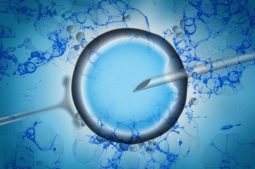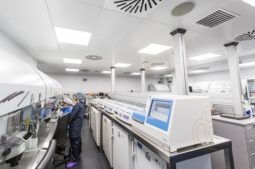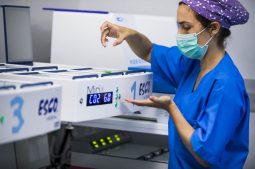For anyone considering any kind of fertility treatment, it can be difficult to untangle exactly what each kind of assisted reproduction technique entails. How does each intervention technique work? What is in vitro fertilisation (IVF)? How much does artificial insemination cost and what is involved? Which might be the most suitable treatment for you or for you and your partner?
All these questions and more are bound to crowd into your mind as you prepare to seek help with a fertility problem. In this article we aim to set out, simply and clearly, what you may need to know at this stage. There are some similarities between these two treatments, and they are both commonly used techniques that increase your chances of a successful pregnancy. There are also some significant differences in the way that this is achieved.
What are the similarities between IVF and Artificial Insemination (AI)?
Both IVF and artificial insemination, also known as intrauterine insemination, involve the use of fertility drugs to stimulate the ovaries to produce more eggs than the normal one per monthly cycle. Both techniques also involve the preparation of a sperm sample so that only the healthiest sperm are used for fertilisation. The crucial difference between the two is that with artificial insemination, fertilisation takes place inside the woman’s fallopian tube. With IVF, fertilisation takes place in the laboratory and then following selection and appropriate testing, an embryo is placed inside the woman’s uterus, there to implant and develop in the normal way. Let’s take a look at more details.
Artificial Insemination
Artificial insemination is a very simple and minimally invasive fertility treatment that respects the natural environment of the gametes as far as possible. This is a process which increases the chances of pregnancy through making sure that there is an oocyte available to be fertilised in the right place at the right time, while preparing the sperm so that only high-quality sperm meets up with the egg.
How does artificial insemination work?
- The first step is ovarian stimulation to ensure that the ovaries produce one or two eggs. The stimulation is monitored by ultrasound scans and blood tests. When the follicles are sufficiently developed, a dose of the hCG hormone is administered to trigger ovulation. Insemination is scheduled for 36 hours later.
- At the same time on the day that insemination is to take place, the sperm sample is prepared. This allows for the healthiest sperm with the best motility to be selected and for those which are slow or immobile to be discarded.
- Intrauterine insemination then takes place in a doctor’s office. It is a very simple procedure in which the sperm is inserted into the uterus using a catheter. Two weeks later, a blood test confirms whether the patient is pregnant and if so, she continues her pregnancy in the normal way under the supervision of a midwife or gynecologist.
Who is intrauterine insemination for?
- Women who do not have a partner and have normal fertility.
- Women who have problems with ovulation, or where there is an abnormality of the cervix.
- Heterosexual couples where the man has moderate or slight sperm quality defects.
How much does artificial insemination cost?
At IVI, we guarantee the price of any particular treatment, excluding diagnostic tests and additional techniques which can vary from patient to patient. For more information, you can check the published prices on our website.
What is in vitro fertilisation (IVF)?
IVF is the best known fertility treatment, and one which is very well established, resulting in the birth of over eight million children since the first IVF live birth just over 40 years ago. In this technique, egg and sperm are put together in the laboratory and one of the resulting embryos is selected and implanted into the woman’s womb. IVF has better success rates than intrauterine insemination.
How does IVF work?
• The first step is ovarian stimulation in order for the ovaries to produce multiple eggs. When these have reached the right size and number, an hCG injection, as for artificial insemination, triggers the maturation of the eggs. Just 36 hours later, the eggs are retrieved in a simple surgical procedure.
• Eggs and previously prepared sperm are then united in the laboratory in one of two ways. The original method was to mix the two in a culture dish in order for fertilisation to take place. A more recent refinement, and one which is increasingly used, is a high-precision technique called intracytoplasmic sperm injection (ICSI). In ICSI, a single selected sperm is microinjected directly into the egg.
• The fertilised eggs are cultured in the laboratory for around five days after which time the best quality embryos are selected for replacing into the maternal womb in a quick and painless procedure.
Who is IVF for?
IVF, using partner or donor sperm, could be recommended for:
• Women who have undergone previous unsuccessful fertility treatments such as artificial insemination.
• Women who suffer from advanced endometriosis or have damaged or absent fallopian tubes.
• Couples for whom it is necessary to carry out a preimplantation genetic test in order to prevent an inheritable abnormality.
• Couples in which the man has very poor sperm quality.
You can look up more details about the entire IVF and ICSI procedure on our website. The same as for artificial insemination, we guarantee the cost of treatment excluding diagnostic tests and complementary techniques which vary according to the patient’s individual circumstances.
Any more questions?
We hope we’ve given you a clear general idea about artificial insemination and in vitro fertilisation. However since every case of infertility is individual, there may well be additional information about your own particular situation that you would like to ask about. Don’t hesitate to contact us with your questions, or simply make an appointment using our online contact form. Whatever the problem, there is probably a solution!





Comments are closed here.